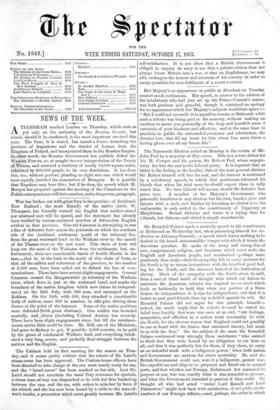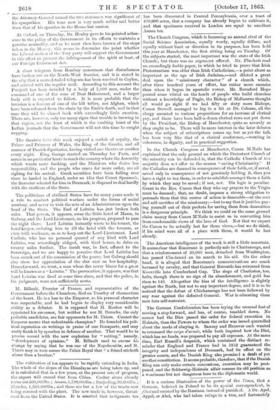Sir Roundell Palmer made a masterly speech to his constituents
at Richmond on Wednesday last, when presenting himself for re- election as Attorney-General,— a speech which leaves nothing to be desired in the broad, statesmanlike temper with which it treats the American question. He spoke of the many and strong ties of race, temperament, religion, and literature which mu,t unite the English and American people, and maintained—perhaps more graciously than truly—that the sympathy felt in many quarters for the South is by no means inconsistent with the heartiest good feel- ing for the North, and the sincerest hatred of the institution of slavery. Much of the sympathy with the South arises, lie said, from a sort of blind habit of thought with which our failure to maintain the American colonies has inspired us—a creed which leads us habitually to hold that when any portion of a State desires its independence it is ripe for independence, and that it is better to part good friends than try to hold it against its will. Sir Roundell Palmer did not argue for this principle himself— indeed, his words imply that he rejects it—and he stated his belief very forcibly that were war once at an end, "our feelings, sympathies, and affinities as a nation must necessarily be with the North, for the obvious reason that England could not possibly be one at heart with the States that sustained slavery; but must be so with the free." On the subject of the rams Sir Roundell Palmer condemned very strongly those merchants " who seemed to think that they were bound by no obligation to our laws at all, and that it was perfectly fair for them, if they chose, to carry on an unlawful trade with a belligerent power," when both nation and Government are anxious for strict neutrality. He said the British Government could not, were it a belligerent, permit war- like expeditions and ships to be prepared and fitted out in neutral ports, and that whether our Foreign Enlistment Act answered its purpose or not, this was exactly what it was intended to prevent, and what the Government intended to prevent if they could. He thought all who had acted " under Lord Russell and Lord Palmerston" might look back with satisfaction, if not pride, on the conduct of our Foreign Affairs,—and, perhaps, the order in which































